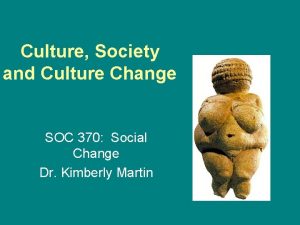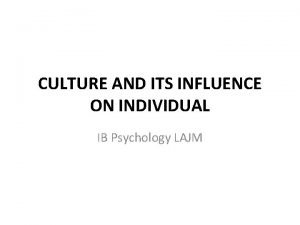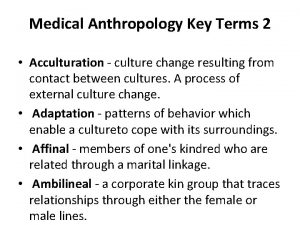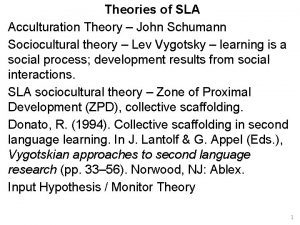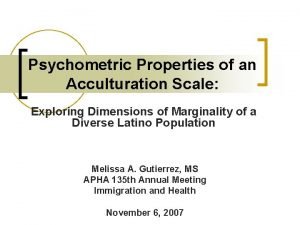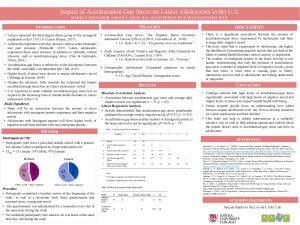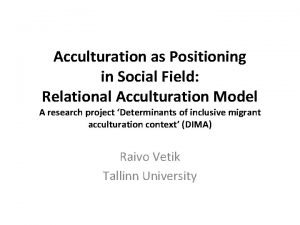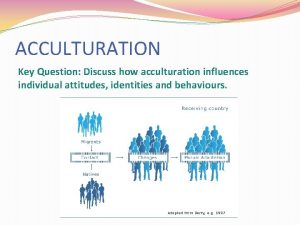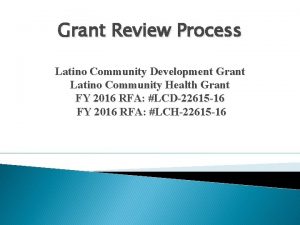THE IMPACT OF ACCULTURATION AND MIGRATION ON LATINO




























- Slides: 28

THE IMPACT OF ACCULTURATION AND MIGRATION ON LATINO MENTAL HEALTH Claudia Mercado, MD Faculty Development Training CCLP

Objectives • Learn about prevalence of mental health problems among Latinos • Explore risk factors for depression and anxiety among immigrant Latino patients • Introduce the concept of Acculturation, and acculturative stress. • Assess the level of acculturation in this population and how it is related to their symptoms. ▫ Acculturation Scale ▫ CES-D • Explain the significance of acculturation and migration on the mental health of immigrant Latino patients. • Recognize how depression is commonly presented among this population. • Identify the major barriers to mental health care • Promote awareness of this problem among providers to reduce health care disparities.

Background • Hispanics are the largest minority group in the country. • As the Hispanic population continues to grow, the concern about understanding the healthcare needs especially mental health augment. • Mental health is a silent issue among Latinos and is related to multiple factors including stress related to migration and acculturation levels across generations among others.

• Family physicians can play a critical role in addressing such racial and ethnic health disparities. • Hispanics are as twice as likely to seek help for mental health form a PCP as from a mental health specialist.

Prevalence of Mental Health Disorders Among Latinos • Latinos are identified as a high risk group for depression, anxiety disorders and substance abuse (3).

Epidemiology • The prevalence of depression is higher in Latino women (46%) than Latino men (19%) (3). • In a recent study, it was found that 52 percent of Latino women are depressed (3). • This trend as also been observed at the Jorge Prieto Health Center of Cook County in Chicago. This clinic serves a predominately Latino community in its majority Mexican and Mexican American.

Risk Factors • Many factors have been identified to contribute to depression: ▫ ▫ ▫ Recent immigration and immigration status Acculturation and acculturative stress Family oriented cultural values Poverty Language barriers Health care access among others (1, 4, 5).

Acculturation and Acculturative Stress

Definition • Acculturation is a process in which members of one cultural group adopt the beliefs and behaviors of another group – food, music, language, sports, etc. • Measurement: ▫ Acculturation Scales


• Assimilation of one cultural group into another may be evidenced by changes in: ▫ language preference ▫ adoption of common attitudes and values ▫ membership in common social groups and institutions ▫ loss of separate political or ethnic identification.

Clinical Correlation: • Establish the patient’s language of preference for interviews. • Attachment to their culture can impact illness interpretation and treatment negotiation. • Find about pt’s pre-migration experiences • Assess the impact of acculturation on diet • Investigate about circumstances of migration, family and social support

Impact of Acculturation on health • The effect of Acculturation on Latinos behavior and health is very complex. The effects are not always on the same direction. ▫ More acculturated Latinos are more likely to engage in substance abuse and undesirable dietary habits. ▫ However, acculturation has positive effect on health care use and perceptions of health

• Acculturative stress occurs when individuals experience problems with acculturation process. • It significantly affects the physical and mental health of many Latino immigrants. ▫ Types of stressors vary by ethnicity. ▫ Separation from family and lack of a community was the most often-cited stressor for new immigrants. ▫ Most Latino immigrants were adversely affected by discrimination.

• Overall findings suggest that adult Mexican immigrants who experience elevated levels of acculturative stress may be at risk for experiencing critical levels of depression and suicidal ideation.

• Because children of immigrants acculturate more quickly than their parents, second generation youth may feel cough between the opposite values of their parents and peers or experience conflict between their own values and those of their less acculturated parents.

Effect of Migration • • Lack of Social Support Immigration status Leaving family in country of origin Traumatic experiences from the travel

Recognizing Depression among Latino Patients • As primary care physicians who work with culturally diverse populations, it is essential to know the different presentations of depression in this group in order to adequately diagnose them.

• The presentation of somatic symptoms to describe mental distress can be challenging in the detection of depression in primary care. ▫ Pts with MDD with somatic presentations may present with little sadness or depressed mood especially in first assessment.

Clinical correlation: • Ask about pt’s understanding of somatic sx • Clarify pt’s use of specific cultural idioms of distress to describe somatization process • Recognize somatic symptoms are real and not imaginary

• Explore physical sx in the context of stressors with open ended questions • Rule out alternative DDx • Pts with somatic complains feel relief when perceive that PCP believe and listen to them

Common barriers to Mental Health Care • Access to Health Care • Language barrier • Stigma of Mental illness • Lack of Bilingual and cultural competent providers

Provider Role in decreasing Disparities

• In the treatment of mental disorders, there is an awareness about inadequate care for depression among US Hispanics. • Hispanics are less likely to be diagnosed with depression, and to initiate and maintain treatment (2). • These inequalities in care for Latinos are due to the lack of access to care and service barriers.

• Hispanics as a group are agreeable to treatment (1). • Effectiveness of different treatment options need to be evaluated to investigate the best therapeutic approach for this population (6).

Summary

References • • 1. - Lewis-Fernandez, R. , Das, Amar. . “Depression in US Hispanics: Diagnostic and Management Considerations in Family Practice. ” JABFP July-August 2005 Vol 18 No. 4. 282 -296. • • 2. - Alison Karasz, Ph. D and Liza Watkins, MA. “Conceptual Models of Treatment in depressed Hispanic Patients. ” Ann Fam Med. 2006 November; 4(6): 527– 533. • • 3. - Latino Community Mental Health Facts (Copyright © NAMI) • • 4. -Mendelson, T. Rehkpf, D. “Depression Among Latinos in the United States: a Meta. Analysis Review. ” Journal of Counseling and Clinical Psychology. 2008. Vol 78. 355 -366. • • 5. - Isabel T. Lagomasino, M. D. , M. S. H. S. , Megan Dwight-Johnson, M. D. , M. P. H. , “Disparities in Depression Treatment for Latinos and Site of Care. ” Psychiatr Serv 56: 15171523, December 2005. • • 6. - Jeanne-Marie R. Stacciarini a; Meaghan O'Keeffe b; Melissa Mathews • “Group Therapy as Treatment for Depressed Latino Women: A Review of the Literature” Issues in Mental Health Nursing, Volume 28, Issue 5 May 2007 , pages 473 - 488

 Acculturation and enculturation
Acculturation and enculturation Acculturation model and accommodation theory of sla
Acculturation model and accommodation theory of sla Define nativization theory
Define nativization theory Enculturation vs acculturation
Enculturation vs acculturation Fla vs sla
Fla vs sla Acculturation pros and cons
Acculturation pros and cons Assimilation acculturation
Assimilation acculturation Dietary acculturation
Dietary acculturation What is acculturation in sociology
What is acculturation in sociology Cultural divergence definition geography
Cultural divergence definition geography Odden and rochat
Odden and rochat Acculturation anthropology
Acculturation anthropology Transculturation vs acculturation
Transculturation vs acculturation Theories of acculturation
Theories of acculturation Ethnic studies vocabulary
Ethnic studies vocabulary Example of linguistic fragmentation
Example of linguistic fragmentation What is acculturation
What is acculturation Hình ảnh bộ gõ cơ thể búng tay
Hình ảnh bộ gõ cơ thể búng tay Bổ thể
Bổ thể Tỉ lệ cơ thể trẻ em
Tỉ lệ cơ thể trẻ em Gấu đi như thế nào
Gấu đi như thế nào Tư thế worm breton
Tư thế worm breton Hát lên người ơi
Hát lên người ơi Kể tên các môn thể thao
Kể tên các môn thể thao Thế nào là hệ số cao nhất
Thế nào là hệ số cao nhất Các châu lục và đại dương trên thế giới
Các châu lục và đại dương trên thế giới Công thức tính thế năng
Công thức tính thế năng Trời xanh đây là của chúng ta thể thơ
Trời xanh đây là của chúng ta thể thơ



